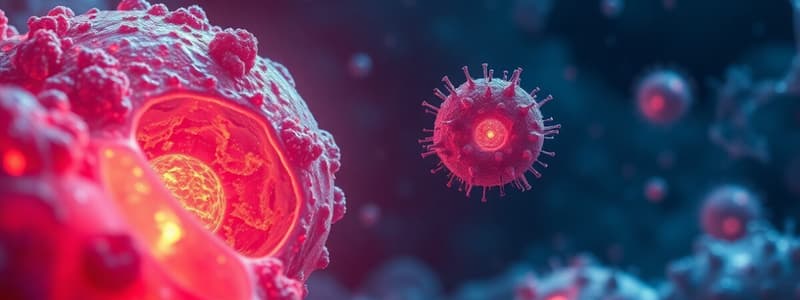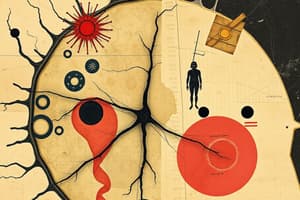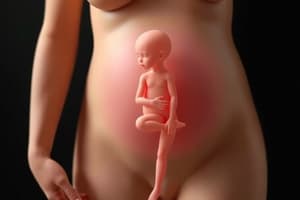Podcast
Questions and Answers
What occurs after a sperm penetrates the egg cell during external fertilization in sea urchins?
What occurs after a sperm penetrates the egg cell during external fertilization in sea urchins?
- The sperm nucleus and egg nucleus fuse. (correct)
- The egg immediately begins dividing.
- The egg nucleus prevents fusion with sperm nuclei.
- The egg allows other sperm to enter.
What did Theodor Boveri conclude from his experiments with enucleated eggs?
What did Theodor Boveri conclude from his experiments with enucleated eggs?
- The nucleus determines the characteristics of the organism. (correct)
- Sperm has no role in the development of an organism.
- The characteristic of an organism is solely based on environmental factors.
- Only the egg contributes to the hereditary material.
What was the outcome of grafting a cap from one species of Acetabularia onto the base of another species?
What was the outcome of grafting a cap from one species of Acetabularia onto the base of another species?
- The cap develops according to the base species characteristics. (correct)
- The cap develops characteristics of the grafted species.
- The cap fails to regenerate at all.
- The cap forms a completely novel structure.
What does the nucleus contain that is essential for heredity?
What does the nucleus contain that is essential for heredity?
Which of the following statements about embryo development in sea urchins is true?
Which of the following statements about embryo development in sea urchins is true?
What does the nucleus primarily control within a cell?
What does the nucleus primarily control within a cell?
What happens to an enucleated egg when sperm is introduced?
What happens to an enucleated egg when sperm is introduced?
What implication does the fusion of the sperm and egg nuclei have for the zygote?
What implication does the fusion of the sperm and egg nuclei have for the zygote?
What is epigenesis?
What is epigenesis?
Who first proposed the theory of epigenesis?
Who first proposed the theory of epigenesis?
What does the preformation theory suggest about the development of organisms?
What does the preformation theory suggest about the development of organisms?
What significant discovery did Robert Brown make in 1831?
What significant discovery did Robert Brown make in 1831?
What conclusion was drawn from the fertilization studies in the 1870s?
What conclusion was drawn from the fertilization studies in the 1870s?
Who is known as the 'Father of Microbiology'?
Who is known as the 'Father of Microbiology'?
What description fits the initial concept of a zygote?
What description fits the initial concept of a zygote?
What limitation did early creationist theories impose on the scientific community?
What limitation did early creationist theories impose on the scientific community?
Flashcards
External Fertilization
External Fertilization
The process where sperm and egg cells fuse together to form a zygote, which is the first cell of a new organism.
What is the Nucleus?
What is the Nucleus?
The central part of a cell that contains the genetic material (DNA) which directs all the cell's activities.
Enucleated Egg
Enucleated Egg
Removing the nucleus from a cell, leaving only the cytoplasm.
Boveri's Experiment
Boveri's Experiment
Signup and view all the flashcards
Acetabularia
Acetabularia
Signup and view all the flashcards
Hammerling's Experiment
Hammerling's Experiment
Signup and view all the flashcards
Hereditary Material
Hereditary Material
Signup and view all the flashcards
Mitosis
Mitosis
Signup and view all the flashcards
Meiosis
Meiosis
Signup and view all the flashcards
Epigenesis
Epigenesis
Signup and view all the flashcards
Preformation
Preformation
Signup and view all the flashcards
Antonie Van Leeuwenhoek
Antonie Van Leeuwenhoek
Signup and view all the flashcards
Robert Brown
Robert Brown
Signup and view all the flashcards
Fertilization
Fertilization
Signup and view all the flashcards
The Nucleus
The Nucleus
Signup and view all the flashcards
Zygote
Zygote
Signup and view all the flashcards
The Nucleus's contribution to development
The Nucleus's contribution to development
Signup and view all the flashcards
Study Notes
Epigenesis
-
Describes the development of plants, fungi, and animals from a seed, spore, or egg through a series of steps where cells differentiate to form organs
-
Proposed by Aristotle (384-322 BC)
-
- Creationist theories hinder acceptance of scientific explanations regarding the origins and development of life. These theories often conflict with empirical evidence and can foster a reluctance to embrace evolutionary biology and other scientific findings that contradict traditional creation narratives.
Preformationism
- Theory suggesting an embryo develops from a complete miniature version of the mature organism
- All organisms were created simultaneously
- Succeeding generations develop from homunculi (miniature humans) or animalcules
- Homunculi had their own sperm for reproduction
- Explained conception as the incubator role of the woman and seed of the man.
- The role of the mother was questioned in how offspring resembled the mother
Microscopy
- 1671: Antonie van Leeuwenhoek, a Dutch draper, invented simple microscopes for cloth inspection
- Used single lenses for superior magnification (270X)
- Discovered microscopic organisms (animalcules) – "Father of Microbiology"
Discovery of the Nucleus
- 1831: Robert Brown, a Scottish botanist, discovered the nucleus in plant cells
- Improved lenses facilitated observation
- Called it "Nucleus" (Latin for "little nut")
The Nucleus - Discovery of Function
- Fertilization studies (1870s):
- Sperm + egg = zygote (first cell of the new organism)
- Sperm contains a nucleus (and little cytoplasm)
- Nucleus was determined to be important in development
- Theodor Boveri (1889):
- Sea urchins - external fertilization and development
- Enucleated eggs (nucleus removed)
- Sperm from a different species added
- Conclusion: The nucleus determines organism's characteristics
- Joachim Hammerling (1943):
- Acetabularia - large unicellular algae (2-5 cm tall)
- Consist of cap, stalk, and base; nucleus in base
- Removed the cap: base regenerated a new cap that matched species of the initial base
- Nucleus controls development
Fertilisation
- Oscar Hertwig (1875):
- Sea urchins – external fertilization & development
- Observed sperm penetrating the egg cell
- Sperm & Egg nuclei fuse soon after
- Embryo develops into an individual with parental traits
- Nuclei of both egg & sperm carry hereditary material.
Summary
- Nucleus controls cell functions and development
- Sperm and egg nuclei fuse to create a zygote
- Hereditary material resides in the nucleus
Studying That Suits You
Use AI to generate personalized quizzes and flashcards to suit your learning preferences.




